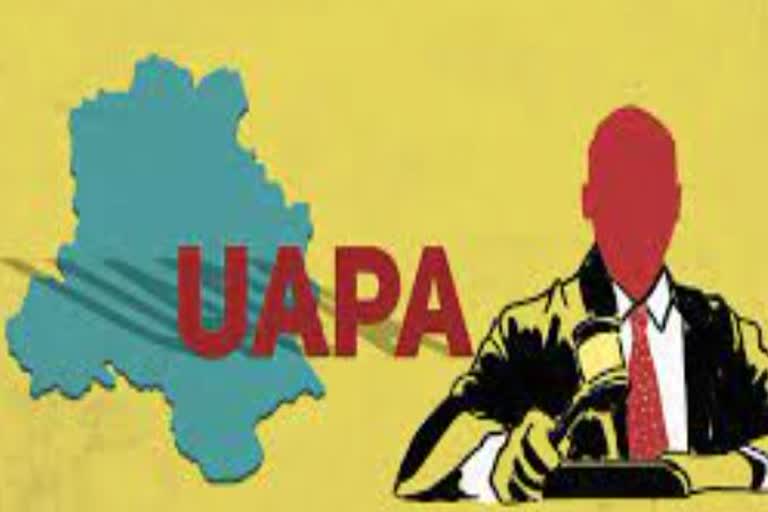Hyderabad : Administration does not mean intimidation. That which gags the people’s voice is not a democracy. Rulers of a democratic polity should respect political liberty of those who differ with them. They should create an atmosphere in which everyone should be able to fearlessly speak out about the insufficiencies in government policies. They should create systems which enable patient consideration of people’s grievances and their timely resolution.
In our country democracy is shining in the eloquent speeches of our leaders and the fine print of books. The reality is, however, quite different. The misuse of the Unlawful Activities Prevention Act (UAPA) is the best example for the tendency. The law is being misused by the governments of the day to suppress the voice of dissent. Last year, the Delhi High Court had observed that the government was erasing the dividing line between terrorist activities and the activities meant to assert the Constitutional right to differ with the government. This observation highlighted the tightening of the noose around the opposing voices.
The Union Government has revealed on the floor of Rajya Sabha that while altogether 4690 persons were arrested under UAPA between 2018 and 2020, only 149 were convicted. Since the year 2014, as many as 10,552 persons were arrested under the Act over a period of seven years. However, only 253 of them were convicted.
Also Read-Conviction rate in cases registered by Centre under UAPA 94.17 pc: Govt tells Parliament
These statics reveal the way in which the police, politician nexus has been causing gross violation of human rights. Three Kashmiri youngsters named Mohammed Ali Bhat, Latif Ahmed Vaja and Mirza Nissar Hussain were arrested in 1996, on the allegations terrorism. They were, however, acquitted after spending 26 years behind the bars. The charges levelled against them were quashed by the by the Delhi and Rajasthan courts. Can anyone return to them the precious years they spent in jail? Does fight against terrorism mean subjecting innocents to harassment? Another Kashmiri named Aijaz Baba was arrested by Gujarat policemen in 2010 under the provisions of UAPA.
After 11 long years, the local court ordered his release saying that there was no evidence pointing to his involvement in terrorist activities. The court opined that the prosecution’s argument revolved around emotional issues only. Mohammed Ilias and Irfan were arrested by the Maharashtra Anti Terrorist Squad in 2012 alleging that they have conspired to kill political leaders, police officers and journalists. Charges were made against them under UAPA. Subsequently the case was handed over to the National Investigation Agency also. Finally a special NIA court acquitted them.
The victims sobbed inconsolably saying that nine valuable years of their lives were lost. Who can wipe their tears? More than 50 percent of those being arrested under UAPA are from 18 to 30 years age group. While the accused languish in the dark dungeons, the lives of their family members are also ruined due to the loss of the bread winner. In many cases the lives of the near and dear ones of the accused are lost by the time the court declares acquittal.
UAPA came into being over five and half decades ago. The UPA and NDA governments made amendments to the act in 2004, 2008, 2013 and 2019. The amendments further sharpened the claws of the draconian law making it even more difficult for the accused to get bail. There is a lot of confusion in the name of the law itself. When there are so many provisions of the regular law which help contain unlawful activities in a constitutional manner, where was the need of a special law which encroaches upon the constitutionally sanctioned right to live?
Delhi police detained student leaders named Devangana Kalita, Natasha Narwal and Asif Iqbal under the UAPA, for staging protests against the Citizen Amendment Act. Finding fault with the invoking of the draconian law by the police, the Delhi High Court said such misuse of the law could lead to the collapse of democracy. Governments elected by the government tended to lose people’s trust when it misuses its power to create anarchy in the society.
Courts usually grant bail to the accused in cases booked under the other laws. The Supreme Court had stated in 1994 that cases were being booked under laws like TADA to tie the hands of the courts from granting bail. It said the law was being blatantly misused by the police. The UAPA is also following the line of TADA. Last year the Tripura police had booked advocates and journalists under UAPA for raising their voices against the communal violence that took place in the State. Editors Guild had also raised concern over the misuse of the law. It is a matter of dismay that high sounding words of our leaders on international forums about democratic values and freedom of expression are not matching with the ground realities.
Most of the cases booked under UAPA were from Assam, Jharkhand, Manipur, Tamilnadu and Uttar Pradesh. Retired bureaucrats and retired judges have been expressing concern over the unabashed misuse of the law. They have been unequivocal in their contention that such draconian law cannot have any place in a democratic country like ours. Governments have been consigning their letters to the dustbin to make use of the law as an instrument of vengeance against political rivals and ciritics. Government intolerance against individual liberty and opposite view will not only prove to be dangerous, but will also pose a challenge to the very national unity.
Article Written by Sailesh Nimmagadda



